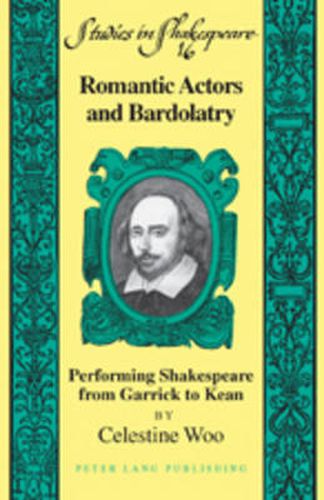Readings Newsletter
Become a Readings Member to make your shopping experience even easier.
Sign in or sign up for free!
You’re not far away from qualifying for FREE standard shipping within Australia
You’ve qualified for FREE standard shipping within Australia
The cart is loading…






This title is printed to order. This book may have been self-published. If so, we cannot guarantee the quality of the content. In the main most books will have gone through the editing process however some may not. We therefore suggest that you be aware of this before ordering this book. If in doubt check either the author or publisher’s details as we are unable to accept any returns unless they are faulty. Please contact us if you have any questions.
Bardolatry , that whimsical term referring to Shakespeare’s rise to canonical status as well as to his worshippers’ adulation, solidified within the theatrical discourses of the eighteenth century and the British Romantic era. Celestine Woo examines the era’s four most celebrated Shakespeare performers in London - David Garrick, John Philip Kemble, Sarah Siddons, and Edmund Kean - arguing that they broadened and altered the boundaries of Shakespearean discourse in specific ways, offering and modeling novel paradigms by which to apprehend Shakespeare, and thus contributing to the growth of bardolatry as a discursive phenomenon. Using Pierre Bourdieu as a model, Woo traces the development of Shakespearean discourse as a field of cultural production, shaped by these actors. By examining their disparate approaches to performing Shakespeare, she reveals that Shakespeare as an icon became commodified, politicized, gendered, and increasingly appropriated within literary and dramatic discourse as a result of the influences of these four performers. Her analysis deepens our understanding of the processes by which Shakespeare was institutionalized as a figure representing national character, human nature, and the breadth of human experience.
$9.00 standard shipping within Australia
FREE standard shipping within Australia for orders over $100.00
Express & International shipping calculated at checkout
This title is printed to order. This book may have been self-published. If so, we cannot guarantee the quality of the content. In the main most books will have gone through the editing process however some may not. We therefore suggest that you be aware of this before ordering this book. If in doubt check either the author or publisher’s details as we are unable to accept any returns unless they are faulty. Please contact us if you have any questions.
Bardolatry , that whimsical term referring to Shakespeare’s rise to canonical status as well as to his worshippers’ adulation, solidified within the theatrical discourses of the eighteenth century and the British Romantic era. Celestine Woo examines the era’s four most celebrated Shakespeare performers in London - David Garrick, John Philip Kemble, Sarah Siddons, and Edmund Kean - arguing that they broadened and altered the boundaries of Shakespearean discourse in specific ways, offering and modeling novel paradigms by which to apprehend Shakespeare, and thus contributing to the growth of bardolatry as a discursive phenomenon. Using Pierre Bourdieu as a model, Woo traces the development of Shakespearean discourse as a field of cultural production, shaped by these actors. By examining their disparate approaches to performing Shakespeare, she reveals that Shakespeare as an icon became commodified, politicized, gendered, and increasingly appropriated within literary and dramatic discourse as a result of the influences of these four performers. Her analysis deepens our understanding of the processes by which Shakespeare was institutionalized as a figure representing national character, human nature, and the breadth of human experience.